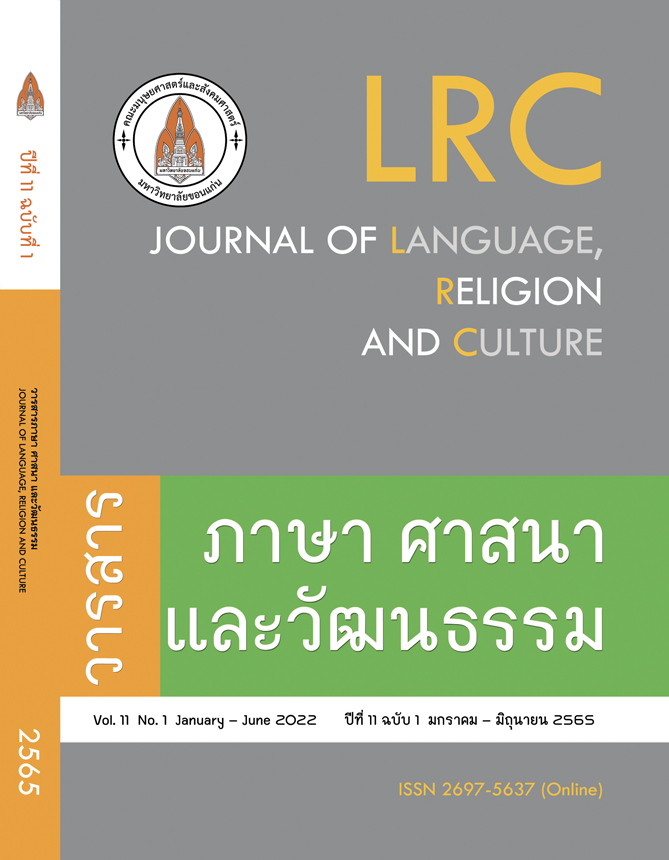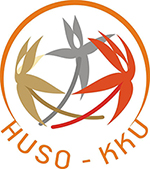The Use of German Adjectives in Literary Translation in Terms of Religious Belief and Culture
การใช้คำคุณศัพท์ภาษาเยอรมันในการแปลงานวรรณกรรมในแง่มุมทางด้านความเชื่อทางศาสนาและวัฒนธรรม
Keywords:
Adjective, Translation, Religious Belief, Culture, คำคุณศัพท์, การแปล, ความเชื่อทางศาสนา, วัฒนธรรมAbstract
This article mainly focuses on the use of German adjectives for literary translation based on religious beliefs and cultural aspects. In this regard, the translation work Phädang-Nangai, translated from Thai into German, was examined. For the data collection and data analysis, adjectives indicating religious belief and culture were specifically collected and purposively analyzed for conducting a semantic method to analyze texts in terms of conveying religious and cultural meanings. Hence, the analysis was performed qualitatively based on the conceptual framework of the study. This leads to the conclusion that adjectives found in the data have both linguistic and communicative functions. Regarding linguistics, they have helped translation work construct the concept of semantic transfer for cross-cultural communication between the two languages. In relation to communicative translation and culture, the use of adjectives is crucial to create and convey the meanings based on attitudes through the text according to the intention of the translator. It is also recommended that this area of study can be further examined in terms of other branches of linguistics and language teaching.
References
Albrecht, J. (2013). Übersetzung und Linguistik. 2. Auflage. Tübingen: Narr Francke Attempto Verlag.
Becker, L, Sprache und Rhetorik der Emotion im Partnererwerbungsgespräch. Tübingen:
Narr Francke Attempto Verlag.
Bohnenkamp, A. (2015). Hybrid statt verfremdend? Überlegungen zu einem Topos der
Übersetzungstheorie. In Colliander, P., Hansen, D. & Zint-Dyhr, I. (Hrsg.) Linguistische Aspekte der Übersetzungswissenschaft. Tübingen: Stauffenburg Verlag.
Duden. (2006). Die Grammatik. Mannheim: Dudenverlag.
House, J. (2003). Übersetzen und Missverständnis. In Wierlacher, A., Ehrlich, K., Eichinger,
L.M., Kelletat, A. F., Michel, W. & Bohrer, K. (Hrsg.) Jahrbuch Deutsch als Fremdsprache.Intercultural German Studies. München: Iudicium.
Koller, W. (2011). Einführung in die Übersetzungswissenschaft. Tübingen: Narr Francke
Attempto Verlag GmbH & Co.KG .
König, K. & Gast, V. (2012) Understanding English-German Contrasts. Berlin: Erich
Schmidt Verlag.
Langenscheidt. (2013). Taschenwörterbuch Englisch. Berlin und München: Langenscheidt KG.
Müller, F. (2011). Interkulturelle Kommunikation: Einfluss kontextuellr und kultureller
Faktoren auf die interpersonelle Kommunikation zwischen Deutschen und Thailändern. Masterarbeit. Lehrstuhl für Kommunikationswissenschaft, Ernst-Moritz-Arndt-Universität Griefswald, Griefswald, Deutschland.
Phya Anuman Rajadhon. (1988). Leben und Denken in Thailand. Eine Auswahl zum 100.
Geburtstag des Autors (S. Götzfried & X. Götzfried, Trans.). Bonn: Deutsch- Thailändische Gesellschaft e.V.
Reimann, M. (2012). Essential Grammar of German. Ismaning: Hueber Verlag GmbH &
Co.KG.
Traoré, S. (2008). Interkulturelle Grammatik. Frankfurt am Mainz: Peter Lang.
Watchakaweesilp, W. (2017): Phadäng-Nangai. Ein literarisches Übersetzungswerk.
Khon Kaen: Khon Kaen University Press.
Downloads
Published
How to Cite
Issue
Section
License
Copyright (c) 2022 JOURNAL OF LANGUAGE, RELIGION AND CULTURE

This work is licensed under a Creative Commons Attribution-NonCommercial-NoDerivatives 4.0 International License.







